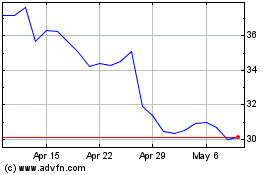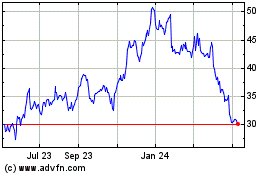EU Court Adviser Backs Intel Appeal Over $1.17 Billion Fine--Update
October 20 2016 - 2:24PM
Dow Jones News
By Natalia Drozdiak
BRUSSELS -- An adviser to the European Union's highest court has
thrown his weight behind Intel Corp.'s appeal against a decision by
the bloc's antitrust regulator to fine the chip maker EUR1.06
billion ($1.17 billion) for abusing its dominant position.
The adviser to the European Court of Justice said on Thursday
that a lower court erred in its 2014 judgment when it threw out the
U.S.-based firm's appeal to the decision "in its entirety." The
adviser said the case needs to be re-examined.
Although the opinion is nonbinding, judges at the EU's top court
typically rule in line with the adviser's view.
The opinion is nonbinding, but judges at the EU's top court
consider the adviser's view when they make a final judgment.
Such a decision by the top court could help Intel recoup much or
all of the fine it had to pay the European Commission, the bloc's
competition authority. The commission imposed the record fine on
the company in 2009 for abusing its dominant position in the
microprocessor market.
A court decision that hews closely to the opinion could also
create a precedent for how the EU deals with other antitrust cases
under its microscope, such as the investigations into Alphabet
Inc.'s Google and Qualcomm Inc.
"The judgment of the general court should be set aside," said
Advocate General Nils Wahl, adding that the case should be referred
back to the general court so it could examine all the circumstances
in the case and determine whether Intel's conduct harmed
competition.
A European Commission spokesman and Intel both declined to
comment because the case is still open.
The commission's accusations centered on rebates that Intel
granted to four major computer manufacturers -- Dell Inc.,
Hewlett-Packard Co. , NEC Corp. of Japan and Lenovo Group -- for
using its microchips between 2002 and 2007.
Its investigation found that Intel had used the rebates, coupled
with its dominant position, to exclude rival Advanced Micro Devices
Inc. out of the market, resulting in less choice for consumers. The
EU also said Intel made payments to electronics retailer Media
Saturn Holding on the condition that it only sold computers
containing Intel's microprocessors.
Intel appealed, arguing that the regulator had
selectively-picked evidence, drawn false conclusions that relied
heavily on speculation found in emails, and ignored evidence that
AMD wasn't harmed.
In its 2014 ruling, the general court said the commission had
showed, to a sufficiently high legal standard, that Intel's use of
rebates could restrict competition. The chip maker appealed the
decision to the highest court, the European Court of Justice.
On Thursday, Mr. Wahl said the general court had erred in its
finding. He said the court failed to take into account all
circumstances when determining whether the company's rebates
amounted to an abuse of a dominant position.
The lower court also failed to establish that the use of rebates
shut out competitors, Mr. Wahl said. He noted that HP and Lenovo
could still buy significant quantities of chips from AMD.
If baked into a formal court judgment, that view could impose a
greater burden on the EU to provide more concrete evidence when
proving that a dominant player has abused its position and shut out
rivals, lawyers say.
The advocate general presents a more relaxed view of a company's
use of rebates, an issue that the commission has raised in its
investigation into Qualcomm.
In addition, Mr. Wahl said the commission had breached EU law on
matters of procedure when it failed to record a meeting it had with
a Dell executive on the case. Such recordings are important for
accused companies to organize their defense.
Write to Natalia Drozdiak at natalia.drozdiak@wsj.com
(END) Dow Jones Newswires
October 20, 2016 14:09 ET (18:09 GMT)
Copyright (c) 2016 Dow Jones & Company, Inc.
Intel (NASDAQ:INTC)
Historical Stock Chart
From Mar 2024 to Apr 2024

Intel (NASDAQ:INTC)
Historical Stock Chart
From Apr 2023 to Apr 2024
